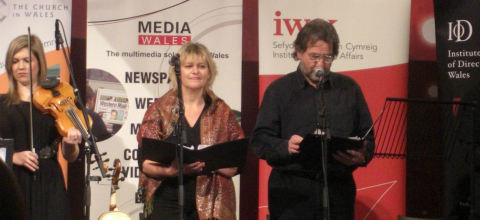One local businessman is opening up the office doors to poets
You’re sat in the office waiting for inspiration to strike, all of a sudden poetry fills your ears, calming you and clearing your mind. After a brief interlude you find yourself refreshed and focused. Strange though it sounds, poets in the work place may soon become a familiar sight in Wales.
Last year the Arts Council of Wales cut funding for 32 organisations, could involvement with local businesses bridge the gap? Local businessman, Ali Anwar, seems to think so.
Mr Anwar, founder of IT training provider CadCentreUK, has set up the H’mm Foundation which launched on 8 December in Wales Millennium Centre. Born from a belief members of the public should have easier access to poetry and should be aware of it as, not only an art-form, but also an effective tool for a happier workforce, the H’mm Foundation hopes to bring poetry into the work place.
The foundation will act as an intermediary between poets and businesses, with participating companies expected to pay a fee to the poet for their time.
For those wondering what is involved in ‘adopting’ a poet Ali says, “A poet could be brought in for simply a one-off event, or there could be a more substantial engagement, such as a year’s incumbency as the organisation’s bard.”
Why Poetry? Why Now?
Ali recently told the Western Mail the effect poetry had on him, “I’ve benefited from the encouragement and advice of writers and poets such as Jon Gower, Gillian Clarke, Nigel Jenkins and Menna Elfyn. I would like to share this enjoyable experience particularly with those who run businesses in Wales.”
He believes the scheme can have an immeasurable effect on staff, “Using the ‘adopt a poet’ scheme, organisations will be able to get a poet to deliver a poetry reading in the workplace, which can add immeasurably to the well-being and happiness of staff.”
So strong is his belief in the power of poetry, he invested the money to set up the foundation.
Cuts and alternative funding.
With funding from the Arts Council down by more than £3.5 million this year, compared to 2010, could private funding be the future for the arts?
One of the poets already signed up to the foundation is Western Mail columnist and poet, Menna Elfyn. Menna became involved with the scheme because she believes it is part of the poet’s role to introduce poetry to new places and environments.
Like Ali, Menna can see the importance of alternative funding for the arts, “I certainly see it as being another way, there will still need to be poetry to remind us of the human condition and that we are subject to other forces such as wonder at the world, beauty, sadness and desire too and we have to bear witness to the world we live in – in an affirmative way.”
Poet and playwright, Gillian Clarke, who Ali cites as one of his inspirations, has also showed her desire to become a part of the foundation. She has already fulfilled commissions to write poems from Welsh Water, and others, and she has faith the relationship has great potential, “We must hope so, though it won’t happen unless we who care about arts funding put pressure on business to help out, at the same time benefitting themselves through the exceptional power of art and artists to express the responses and emotions of the people.”
Benefits to businesses.
So with the poets hoping to gain recognition and awareness of their craft through the foundation, are there any businesses in Wales willing to get involved, particularly during a time of financial crisis?
Robert Lloyd Griffiths, from the Institute of Directors, spoke at the launch of his hopes for poetry and business to become interlinked. He said, “I hope with our association with Ali, we can touch business and we’ll certainly be urging our members to adopt a poet. I hope that the Institute of Directors will support poetry in the workplace in the years to come.”
Other prominent figures who have spoken of bringing poetry to the workplace include Alun Edmunds, managing director of Media Wales and the Archbishop of Wales, Dr Barry Morgan, who says, “The things that we do in life can be made more purposeful by the words we speak.”
The bigger picture.
This particular concept may be unique to Wales, but Menna is amazed by the number of initiatives she has seen set up around the world in countries which don’t have government bodies to fund them. She says, “In many countries there are projects similar in kind, where poets have created their own projects in order to create a sense of shared community, I’m thinking especially of places I’ve visited such as Zimbabwe, the Philippines. In the States too business has helped to create such stunning Festivals, such as San Francisco International Poetry Festival, run by Friends of the Public Library, and they too have depended a great deal on money from businesses.”
Over the last couple of weeks, poetry has made the headlines with well known poets, Alice Oswald and John
Kinsella pulling out of the prestigious TS Eliot poetry prize due to it receiving funding from an investment company. Both said they were uncomfortable with the prospect of funding from a hedge fund company. So can business and poetry work together and not put off the poets? Only time will tell.
For more information, go to www.thehmmfoundation.co.uk

